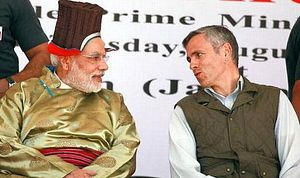On Tuesday, Indian Prime Minister Narendra Modi toured the remote northern areas of Jammu and Kashmir, visiting Leh and Kargil. The visit marks Modi’s second trip to the restive state since coming to office. Modi’s visit, additionally, comes after a Pakistani ceasefire violation across the Line of Control (LoC) — the administrative border between India-controlled and Pakistan-controlled Kashmir — over the weekend. Two Indian Border Security Force (BSF) troops were injured over the 48-hour skirmish. While in Kashmir, Modi addressed Indian Army and Air Force troops in Leh. In his speech, Modi condemned Pakistan in unequivocal terms, stating that Pakistan was making up for its inherent weakness by waging war against India through the use of proxy fighters. Specifically, Modi said Pakistan “has lost the strength to fight a conventional war, but continues to engage in the proxy war of terrorism.”
He further outlined a major three-pronged policy initiative for the development of the region. Modi characterized his plan in terms of three Ps: “Prakash (electricity), Paryavaran (environment), and Paryatan (tourism).” Modi additionally attempted to set himself apart from his predecessors by underlining his commitment to Kashmir: “There was a time when Prime Ministers never visited this state. I have come here two times already, your love has drawn me here.”
With his visit to Kashmir, Modi became the first Indian prime minister to visit the state since India’s last BJP prime minister, Atal Behari Vajpayee, did in 1999. India and Pakistan fought in the Kargil War in 1999 — a war that India won. While Modi mostly focused his rhetoric for his audience in Leh, he visited Kargil to inaugurate the 44-megawatt Chutak power station. In Kargil, he referred to his experiences in Kashmir during the war: “I was here during the Kargil war. People knew I was a BJP worker, yet they never charged me any money. They said this too was a service to the nation. I saw soldiers get help and cooperation from people of Kargil. This kept their spirits high. I still remember the celebrations in Kargil the day Tiger Hill was won.”
Modi’s rhetoric in Kashmir on Tuesday will come off as provocative for Pakistani observers. While Modi did use colorful rhetoric toward Pakistan during his campaign for prime minister earlier this year, he has relatively moderated his views on India’s neighbor since coming to power. Modi’s Kashmir trip will also serve his party’s domestic political purposes. Jammu and Kashmir will head to the polls later for an assembly election this year. In an unfortunate gaffe, Modi referred to an impending “saffron revolution” in Kashmir, evoking a Hindu revolution rather than an economic one involving the saffron spice which is abundant in the state. Muslims are a majority in Kashmir.

































